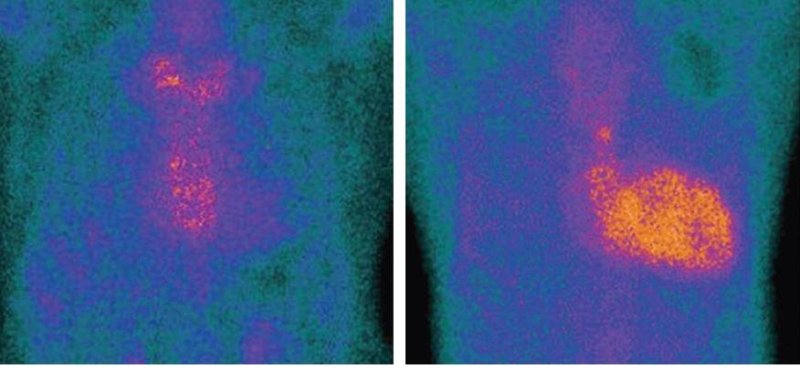A normal heart appears on the left and a patient with transthyretin amyloid cardiomyopathy is on the right. The drug tafamidis was shown in a clinical trial to significantly reduce death and hospitalization from the condition. Photos by Dr. Adam Castano/
NewYork-Presbyterian/Columbia University Irving Medical Center
Aug. 27 (UPI) -- A new drug could become the first one approved by the U.S. Food and Drug Administration to treat an underdiagnosed, progressive form of heart failure following encouraging results in a phase 3 clinical trial.
Deaths and hospitalizations in patients with transthyretin amyloid cardiomyopathy, or ATTR-CM, were reduced, according to research published Monday in the New England Journal of Medicine.
The disease, most common in men over age 60, is caused by heritable genetic mutations or age-related changes in the regulation of transthyretin. Transthyretin becomes unstable and clumps together, forming a sticky amyloid in heart muscle.
Patients with ATTR-CM live an average three to five years after diagnosis, the researchers said.
"ATTR-CM is considered to be a rare disease, but it is underdiagnosed," trial co-leader Mathew S. Maurer, a heart failure specialist at Columbia University Vagelos College of Physicians and Surgeons and NewYork-Presbyterian, said in a press release. "Until recently, cardiologists rarely tested for ATTR-CM, because diagnosis required a heart muscle biopsy and there has been no treatment for the disease. But now that we can detect the disease with noninvasive imaging, we're finding more cases."
Tafamidis stabilizes transthyretin, preventing dissociation and ability to form amyloid.
In the 2 1/2-year study of 441 patients 18 and older -- 264 received the drug and 177 received a placebo -- the drug reduced deaths by 30 percent, cut cardiovascular-related hospitalizations by 32 percent and slowed quality of life compared with a placebo.
Two dosage sizes -- 20 mg and 80 mg -- were tested in the trial.
"Based on this study, tafamidis may offer the first treatment for patients with this type of heart disease," Maurer said. "Right now, the best we can do is manage the symptoms of ATTR-CM."
Patisiran was recently approved by the FDA to treat nerve damage -- not heart disease -- caused by transthyretin.
In Alzheimer's disease amyloid deposits also occur, but the plaques develop through a different manner and cannot be treated with the new drug, the researchers said.
NewYork-Presbyterian/Columbia University Irving Medical Center is among the locations now accepting and enrolling patients as part of the an early access program established by Pfizer, the maker of the drug.
"Tafamidis prevents progression of the disease, and like other preventive drugs, it should be given as early as possible," Maurer said. "We'll need to diagnose people with ATTR-CM earlier for this drug to have the biggest benefit. Currently, patients are diagnosed with advanced disease, and we need to change that."















